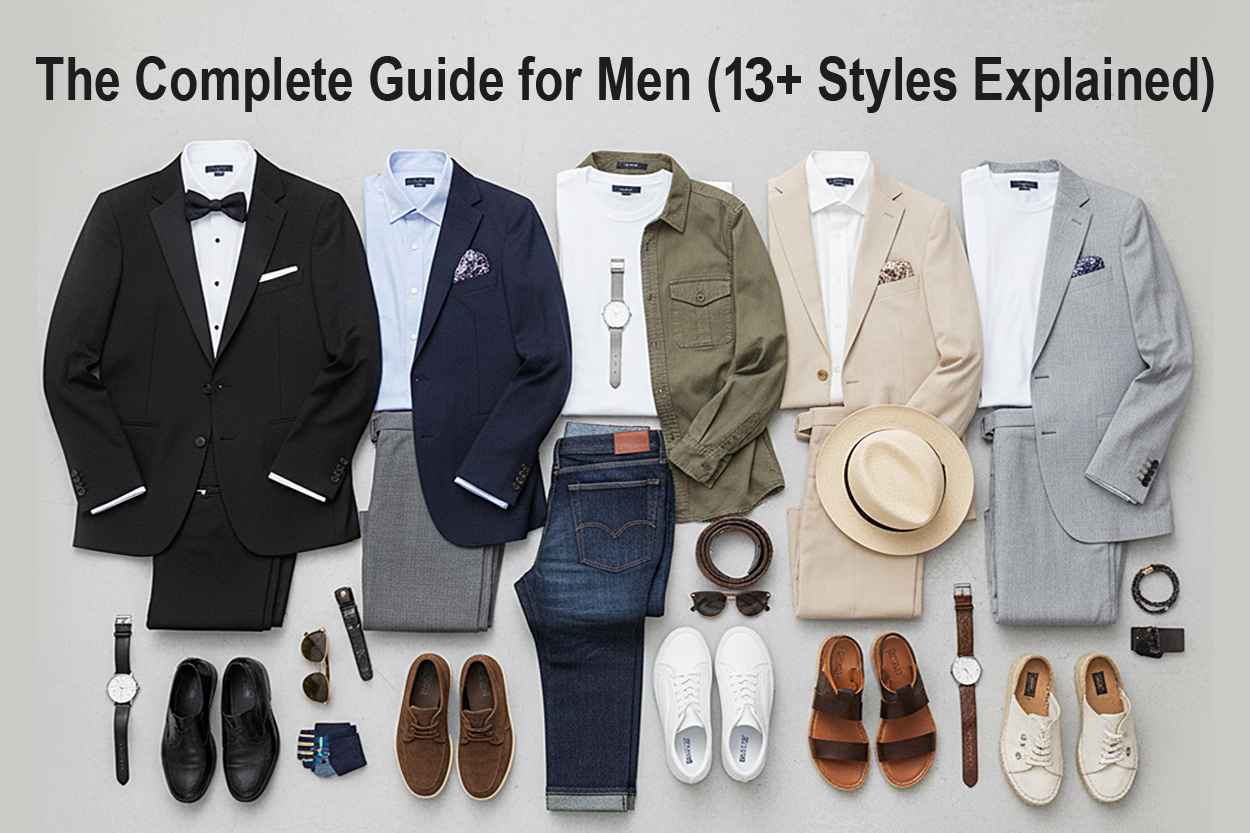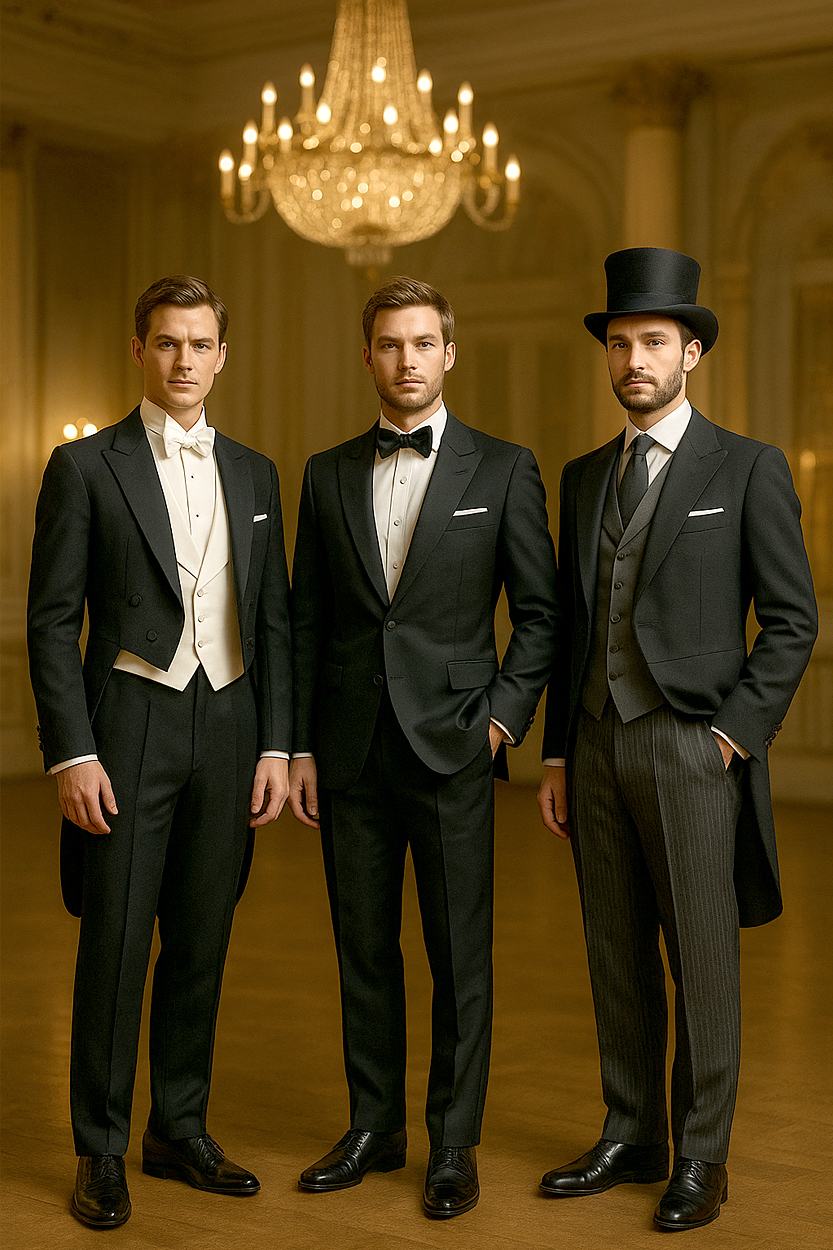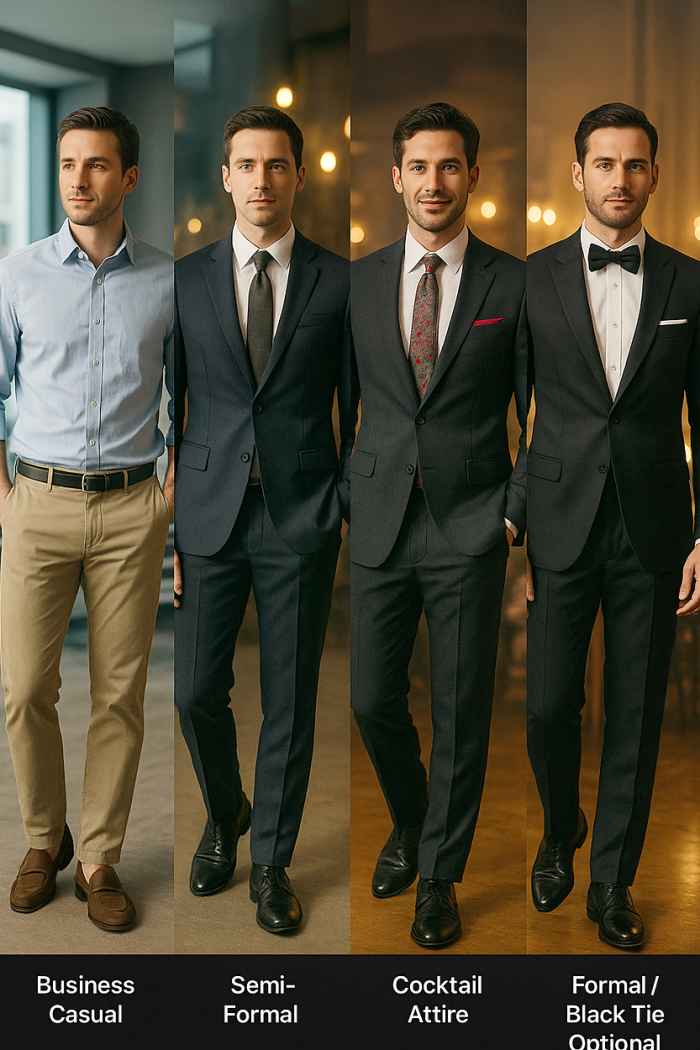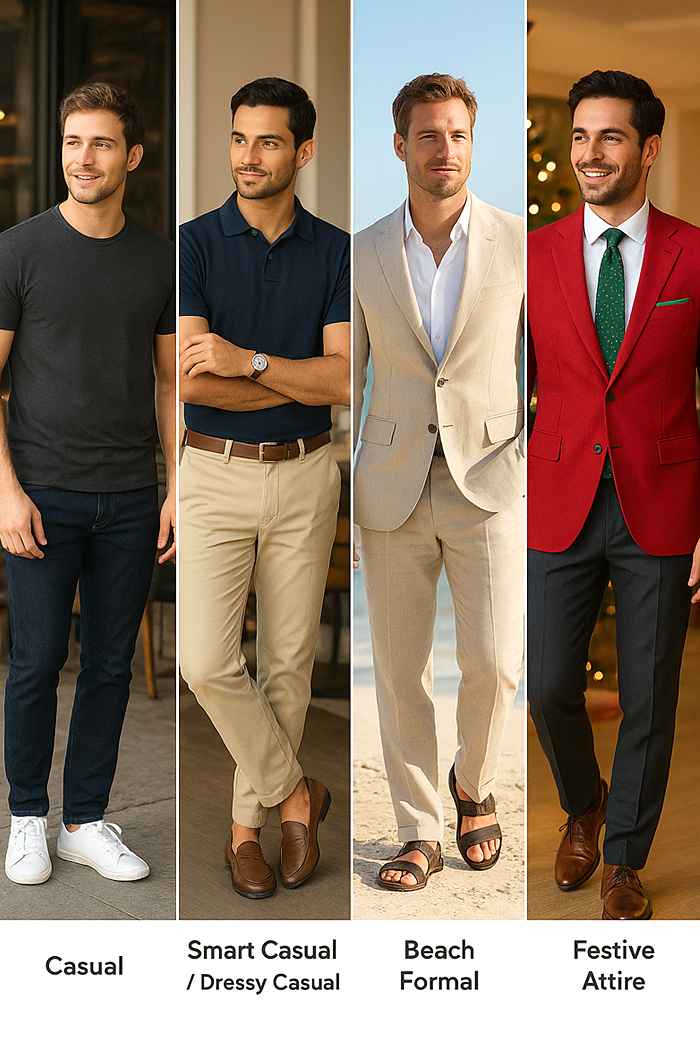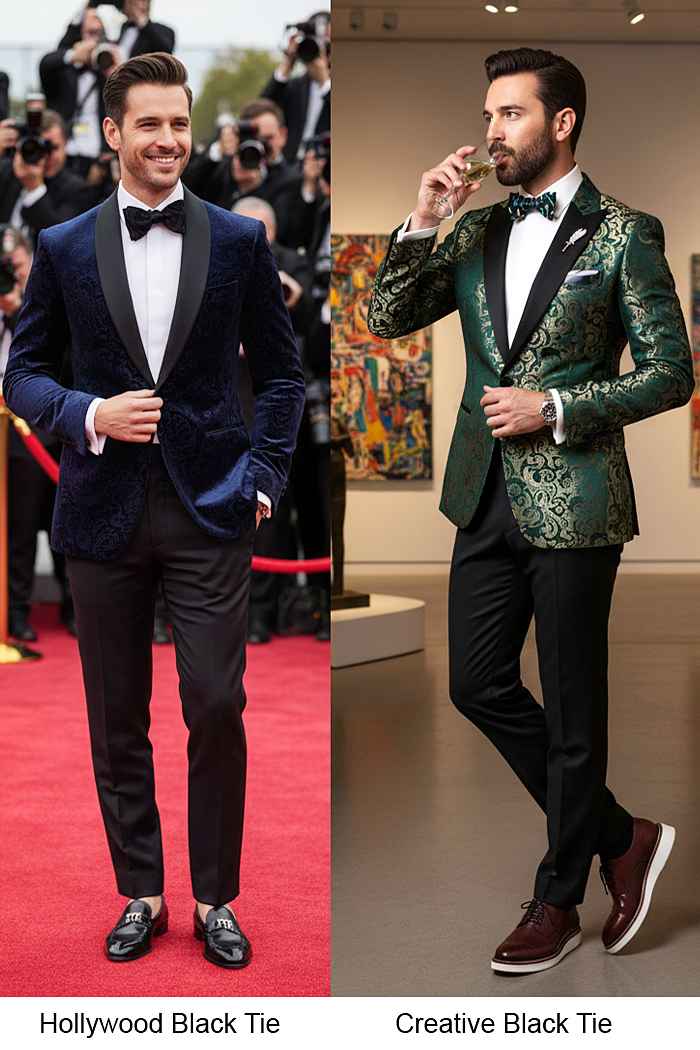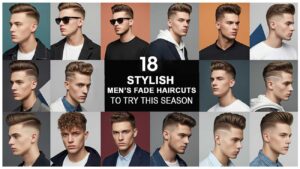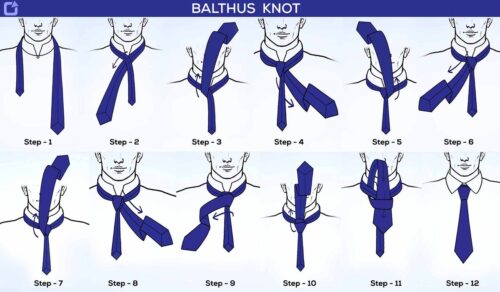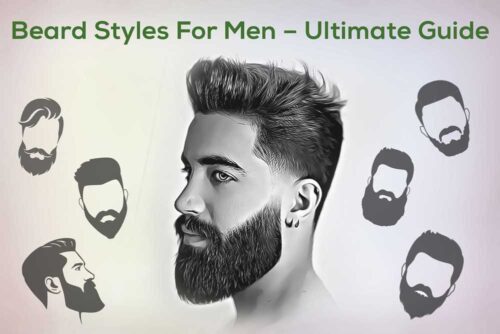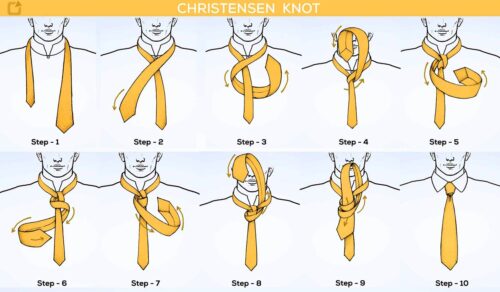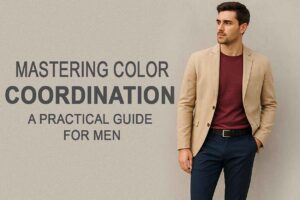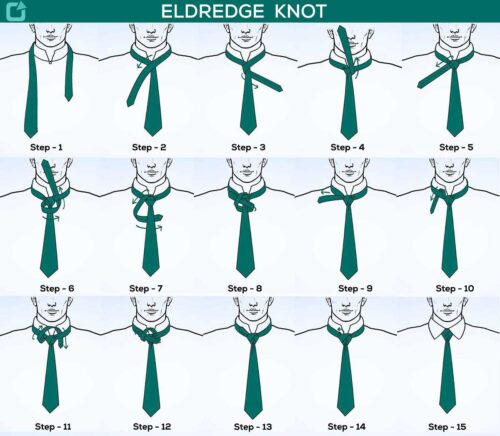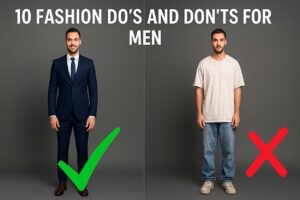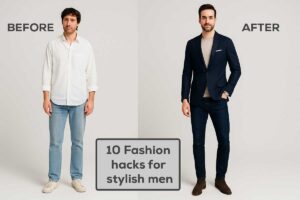The Complete Guide for Men (13+ Styles Explained)
Why Dress Codes Matter for Men
You get invited to a wedding, a work event, or a party – and then you see the words cocktail attire, smart casual, or even black tie optional. Suddenly, you’re second-guessing every outfit in your closet.
The truth is, dress codes aren’t meant to confuse you. They’re social signals. They tell you what’s expected so everyone shows up on the same page. When you understand them, you can stop worrying and start focusing on looking your best.
This guide breaks down more than 13 common dress codes for men, that means when you’ll see them, and how to pull them off without stress.
In this article, I will explain the 4 major styles and share the key points of each style.
1. The Formal Giants: White Tie, Black Tie, Morning Dress
2. Everyday Formality: Business to Semi-Formal
3. The Casual Zone
4. The Creative Twist
The Formal Giants: White Tie, Black Tie, Morning Dress
White Tie (Full Evening Dress)
Where you’ll see it: State dinners, royal events, ultra-formal weddings.
What to wear: Tailcoat tuxedo, white Marcella shirt, white bow tie, white waistcoat, black trousers with satin stripes, and black patent leather shoes.
Modern tip: Unless you’re in politics or high society, you’ll almost never need this. If you do, rent or tailor – fit matters more than the traditional checklist.
Black Tie
Where you’ll see it: Galas, fundraisers, New Year’s parties, formal weddings.
What to wear: Black tuxedo with satin lapels, white tux shirt, black silk bow tie, polished shoes.
Modern tip: Skip the dated cummerbund unless you love the classic vibe. A sharp, well-fitted tux beats an over-accessorized one every time.
Morning Dress
Where you’ll see it: British weddings, Royal Ascot, very traditional ceremonies.
What to wear: Black or gray morning coat with tails, waistcoat, striped trousers, and top hat optional.
Modern tip: Outside of the UK, you’ll rarely see this. If you do, it’s more about honoring tradition than fashion.
Everyday Formality: Business to Semi-Formal
Business Casual
Where you’ll see it: Offices, networking events, conferences.
What to wear: Button-down shirt, chinos or slacks, loafers or dress shoes. No tie required.
Modern tip: Business casual looks different in every office. Tech start-ups lean toward chinos and polos, while law firms expect pressed shirts and blazers.
Semi-Formal
Where you’ll see it: Dinner parties, weddings, evening events.
What to wear: Dark suit, button-down, leather shoes. Tie optional.
Modern tip: Add a tie if the event leans more traditional. Skip it if it’s more social and relaxed.
Cocktail Attire
Where you’ll see it: Parties, weddings, fashion events.
What to wear: Suit and tie, but with room for personality. Pocket squares, patterned shirts, and colorful ties are all welcome.
Modern tip: This is where you can show your style. Think sleek, not stiff.
Formal (a.k.a. Black Tie Optional)
Where you’ll see it: Weddings, charity events, formal dinners.
What to wear: Dark suit and tie, or a tuxedo if you have one.
Modern tip: If the invite says “optional,” assume at least a suit and tie. You’ll never be overdressed in a tux.
The Casual Zone
Casual
Where you’ll see it: Everyday life, casual Fridays, relaxed get-togethers.
What to wear: Jeans, T-shirts, sneakers. The only rule: keep them clean and in good condition.
Modern tip: A fitted T-shirt and dark jeans will always look better than a wrinkled oversized hoodie.
Smart Casual / Dressy Casual
Where you’ll see it: Date nights, dinners, casual offices.
What to wear: Polo shirt, button-down, or sweater with chinos or dark jeans. Stylish sneakers or loafers.
Modern tip: Think “comfortable but put together.” If casual is a T-shirt, smart casual is the upgrade.
Beach Formal
Where you’ll see it: Destination weddings, seaside ceremonies.
What to wear: Linen suit or lightweight blazer, dress shirt, loafers, or clean sandals.
Modern tip: Skip the flip-flops. Polished sandals or loafers keep it classy.
Festive Attire
Where you’ll see it: Holiday parties, themed events.
What to wear: Blazer with a holiday tie, bold colors, or fun accessories.
Modern tip: Balance playful with classy. A Christmas tie works, a Santa onesie does not.
The Creative Twist
Hollywood Black Tie
Where you’ll see it: Red carpet events, fashion parties.
What to wear: Originally a black tie with a suit, now a more relaxed tuxedo vibe with room for personality.
Modern tip: Perfect place for velvet blazers, creative textures, or a dark suit with a stylish bow tie.
Creative Black Tie
Where you’ll see it: Trendy weddings, art galas, fashion-forward events.
What to wear: Tuxedo with a twist – patterned bow ties, colored blazers, statement shoes.
Modern tip: Use it to stand out, not to overwhelm. Let one bold piece do the talking.
Quick Reference Cheatsheet
| Dress Code | Key Outfit |
|---|---|
| White Tie | Tailcoat tuxedo, white bow tie |
| Black Tie | Tuxedo, black bow tie |
| Morning Dress | Morning coat, waistcoat, striped trousers |
| Business Casual | Shirt + chinos, no tie |
| Semi-Formal | Dark suit, optional tie |
| Cocktail | Suit + tie, colorful accents |
| Formal / Black Tie Optional | Dark suit or tuxedo |
| Casual | Jeans + T-shirt |
| Smart Casual | Polo/button-down + chinos |
| Beach Formal | Linen suit, loafers/sandals |
| Festive | Blazer + playful accessory |
| Hollywood Black Tie | Relaxed tux/suit with flair |
| Creative Black Tie | Tuxedo with statement pieces |
Common Mistakes Men Make with Dress Codes
Confusing a black suit with a tuxedo. They’re not the same – tuxes have satin lapels and details.
Overdoing accessories. Less is more. Focus on fit, then add one standout piece.
Ignoring shoes. Scuffed sneakers or worn-out loafers ruin even the sharpest outfit.
Wearing baggy clothes. Tailoring is the secret weapon. A $200 fitted suit beats a $2,000 baggy one.
Not asking the host. When in doubt, ask. Hosts appreciate the effort.
FAQs on Men’s Dress Codes
Q: Can I wear a suit instead of a tuxedo for black tie?
A: Technically no, but at less formal black tie events, a dark suit can pass. Still, a tux is the safer bet.
Q: What’s the difference between business casual and smart casual?
A: Business casual leans office-appropriate (dress pants, button-down). Smart casual is more flexible – you can pair a polo with dark jeans.
Q: Is “black tie optional” just a suit?
A: No. It means a tux is encouraged but not required. A dark suit with a tie works fine.
Q: How do I avoid being underdressed?
A: When unsure, always dress one level up. You can remove a tie or jacket if needed.
Conclusion:
Dress codes don’t have to be intimidating. They’re just guidelines to help everyone show up looking sharp and comfortable. Once you learn the basics, you’ll never panic over an invitation again.
Remember: fit is everything. Clothes that fit well will always look better than trend – chasing outfits that don’t.
GADGETS
Body Mass Index Calculator
Ideal Body Weight Calculator
Body Fat Percentage Calculator
